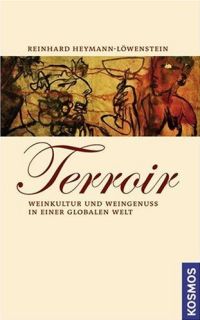 The disputatious vintner Reinhard Löwenstein has positioned the concept of terroir as an alternative to industrial wine. Now he is following up in a book: "Terroir - Wine Culture and Wine Enjoyment in a Global World" discusses the cultural-historical aspects of wine. He writes: "Honest wines have a good sound. But is there a wine that is more than our projection?"
The disputatious vintner Reinhard Löwenstein has positioned the concept of terroir as an alternative to industrial wine. Now he is following up in a book: "Terroir - Wine Culture and Wine Enjoyment in a Global World" discusses the cultural-historical aspects of wine. He writes: "Honest wines have a good sound. But is there a wine that is more than our projection?"
If only it were all about the soil! Then things would be much simpler. The debate over what exactly terroir is has been heated in wine circles, internet forums and public events, and occasionally completely misunderstood with German thoroughness. But the polarization of the term has changed the thinking of many vintners and wine lovers, at least questioned it. It is about whether you can and should taste soil in wine, what complexity and individuality mean, and which interventions in natural processes do a wine good and which do not
In 2003, Löwenstein, in his oenological manifesto "From Öchsle to Terroir", published in the Frankfurter Allgemeine Zeitung, started the discussion about how a good wine could be defined. The discussion thus started is still far from being finished. At the time, he wrote: "Terroir is the exciting learning process of understanding that a good wine is more than the scientifically representable sum of soil, vines, microclimate and human labor: a fragile process of change, a complex entity at the interface of planning and intuition, of control and laisser faire, of Apollo and Dionysus." He has now taken this approach further in a book well worth reading, in which he develops the "terroir" concept of the book's title as "wine culture and wine enjoyment in a globalized world." Löwenstein, familiar with Hegel, Marx, Freud and Wilhelm Reich, pleads with occasional grand gestures against objectivity, linearity, scientificity and predictability
With Karl Marx, he demands at the very beginning of the book that a concept like terroir be not only logically true, but also historically true. "He's right," Löwenstein writes, because all the logical-objective pigeonhole terms are completely inadequate to describe a wine: Semi-dry, low alcohol content, astringent, harmonious acidity and so on. Wine has to be easy to understand - "keep it simple and stupid" - in order to stand for something in a complex world, whatever that may be. He counters this trend with a longing for "honest, authentic, culturally inspired wine" - romance meets enlightenment. "The creative interaction of vineyard, grapevine, climate, and man rather invites contemplation from different perspectives, allows an understanding, comprehension, and sensing of the complex concept of terroir on completely different levels of reality."
In ten chapters, Löwenstein, who proves himself to be a brilliant essayist, considers these levels and perspectives, occasionally even with humor and (self-)irony. So it goes rapidly through the concept of nature and psychology of perception, intoxication and mass wine, the civilizing mission of capital, philosophy, wine democracy and the necessity of maturity of a wine, to return to the terroir as an idea, not as a defined concept
In passing, he attests to the naiveté of the organic and biodynamic vintners with their concept of nature. He proves the latent hostility towards Jews of the founder of biodynamics and anthroposophist Rudolf Steiner ("Judaism as such, however, has long since outlived its usefulness, has no justification within the modern life of peoples", 1888) and describes how much SS leader Heinrich Himmler, one of the main perpetrators of the Holocaust, advocated biodynamic agriculture until Steiner's organisation was finally banned in 1935. Löwenstein will be accused of taking this all out of context
It is good that he grounds his left-wing intellectual past to such an extent that the sharpening of theories, the polarization of thoughts from 2000 years of intellectual history, the changes of perspective and, in contrast, the immersion in the romantic-internal do not throw him off track. Only those who understand the world as a complex entity in permanent change can also produce complex wine, one could shorten his theses. So it rattles and shakes on its way through the terroir view, which turns out (er)knowledgeable, because he develops it with acumen: "Black pedagogy to save the world, morally insane suffering for a good cause, machine-storming rebellion of the 'real winemakers', scholastic search for the ultimate truth - no, the idea of terroir allows for more freedom, understands wine as a systemic concept, dares to have no clear answers ready to many questions, invites emancipation.“ This is what Löwenstein wants: a debate about wine that does not see it as a conglomeration of physical and chemical processes according to the principle of cause-effect, but as part of intellectual and cultural history. This does not make things easier. But according to Löwenstein, it shouldn't: "Complex enjoyment is anything but simple. Fortunately."
Order this book from Amazon
Reinhard Heymann-Löwenstein, Terroir: Wine Culture and Wine Enjoyment in a Global World, hardcover edition, 180 pages, Franckh-Kosmos Verlag, ISBN: 3440117928, 19,95 Euro